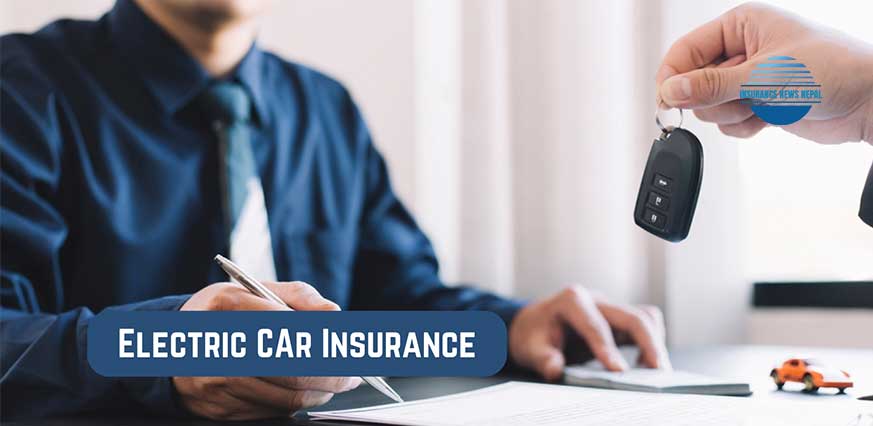As Nepal takes significant strides towards a greener and more sustainable future, the adoption of electric vehicles (EVs) is on the rise. With the increasing popularity of EVs, it’s essential to understand the ins and outs of electric vehicle insurance in Nepal. We’ll go over all the many aspects of insuring your electric car in this post so you have the information you need to make wise choices.
Understanding Electric cars and their insurance
An automobile that runs on electricity rather than conventional internal combustion engines (ICEs) fuelled by gasoline or diesel is known as an electric vehicle (EV). EVs derive propulsion power from electric motors and rechargeable batteries.
Electric car insurance is a special kind of auto insurance created to protect electric automobiles. Similar to insurance for standard gasoline or diesel automobiles, it offers monetary security for mishaps, theft, or EV damage.
Types of Electric Car Insurance
To satisfy the demands of owners of electric cars (EVs), electric car insurance, like insurance for conventional gasoline or diesel-powered vehicles, offers a variety of coverage alternatives. You can come across the following types of electric vehicle insurance coverage:
- Liability Insurance: In most jurisdictions, liability insurance is the bare minimum need for vehicles, including electric vehicles. If you cause an accident and cause damage to other people’s property or injury to other people, it is covered. This insurance does not cover your electric car in the event of damage.
- Collision Coverage: Regardless of who is at fault, collision coverage will pay for repairs to your electric car if it is damaged in a collision with another automobile or object. If you have a car loan or lease, this coverage is frequently necessary.
- Comprehensive Coverage: Incidents unrelated to collisions are covered under comprehensive coverage. It covers robbery, vandalism, weather-related damage (such as hail or flooding), and any unanticipated occurrences that might harm or wreck your electric vehicle.
- Uninsured/underinsured motorist: Uninsured/underinsured motorist coverage safeguards you if you are involved in a collision with a driver who is either uninsured or whose insurance is insufficient to pay for your losses.
- Gap Insurance: If you financed your car, gap insurance is very important for EVs. If your EV is deemed a total loss as a result of an accident or theft, it pays the difference between what you still owe on your auto loan or lease and its real cash worth.
- Rental Car Reimbursement: This insurance helps pay for the expense of renting a substitute vehicle if your electric car is out getting repairs following an accident.
- Coverage for Charging Equipment: Some insurance companies provide coverage for loss or theft of the charging equipment, including home chargers, for electric vehicles.
- Maintenance Coverage: Although uncommon, certain insurance companies may provide coverage for particular maintenance requirements relating to electric cars, such as battery replacement or charging system repairs.
Benefits of Buying Insurance
The advantages of purchasing insurance for your electric vehicle vary according to the particulars of owning an electric vehicle. The advantages of buying insurance for electric vehicles are as follows:
- Component Coverage: Electric vehicle insurance provides coverage for vital electrical parts including batteries and motors.
- EV-specific: It is created to handle the unique requirements and dangers of owning an electric car.
- Environmental reductions: Several insurance companies provide reductions because electric automobiles are environmentally good.
- Lower running expenses: Because EVs have lower running expenses, insurance premiums may be affected.
- Regenerative Braking: Coverage for the regenerative braking systems particular to EVs may be included.
- Charging Equipment: Chargers in the home may also be covered if they sustain damage while being charged.
- Government Incentives: Aids in recovering government incentives if your EV is stolen or totaled.
- Investment Protection: Safeguards the substantial financial investment made in an electric vehicle.
What benefits do electric vehicles have over conventional ones?
Electric vehicles (EVs) enable the realization of energy independence. Traditional petrol stations are no longer necessary, but you still need charging stations to recharge your electric vehicle. Think about how convenient it would be to plug your car in when you got home from work and have a completely charged battery the next morning. Additionally, long-distance driving in an electric car is now more feasible than ever thanks to the rising number of public charging stations around the nation.
The large reduction in maintenance costs is another important benefit of having an electric car. The day when you had to stress about regular oil changes or incidental repairs like radiator hoses, fan belts, and gaskets is long gone. In the long run, EVs save you time and money since their designs are simpler and they have fewer moving components. A more economical and ecologically beneficial method of transportation is made possible by the switch to electric cars, which also supports energy independence.
Challenges of buying electric car Nepal
The Nepal Electricity Authority (NEA) is also conducting studies to determine how many EV charging stations are needed on the country’s roads. This is a component of NEA’s marketing efforts to persuade people to drive eco-friendly cars in the future. The purpose of this study is to locate prospective sites for adding more charging stations. In addition, some of the challenges faced by EVs in the Nepalese market are highlighted below;
Cost:
- Due to variables including hefty taxes, customs fees, import prices, and operation and maintenance costs, owning a vehicle in Nepal is expensive.
- Even electric vehicles (EVs) are expensive, costing an average of USD 17,000 for a basic EV, keeping them out of reach for many.
- Maintenance problems are exacerbated by the scarcity of certain EV brands and components.
- Few EV brands now have a monopoly due to the tiny size of the industry.
Policy and Finance:
- There aren’t any established import and usage regulations for EVs in Nepal.
- While the government provides certain benefits to EV owners, such as road tax exemptions and reduced customs duties, all imported goods are still subject to a 13% tax.
- For EV charging, there is no set fee structure.
- Lower power prices and unique off-peak EV charging programs are required to promote adoption.
Power Availability:
- Existing EV charging stations consume a lot of electricity, which might put stress on the country’s energy infrastructure.
- Challenges include high power tariff prices and clogged distribution networks.
- There aren’t any dependable electrical connections or specialized distribution systems.
Charging Stations:
- Due to expensive technology and installation expenses, private companies own only a few charging stations, most of which are located in large cities.
- The Nepal Electricity Authority (NEA) is putting 50 charging stations in place all around the nation.
- Long-distance EV travel is hampered by a lack of charging facilities.
Target Group:
- EVs are best suited for driving in cities and unsuitable for long-distance or rural routes.
- Present-day electric vehicles (EVs) imported into Nepal frequently have few features, traditional styling, and lesser standards.
- Only upper-income households can afford to use EVs due to high operating and maintenance costs.
- Effective incentives to encourage EV adoption are lacking from the Nepalese government.
You May Also like:
FAQs:
What insurance do you need for electric vehicles?
Why is insurance more expensive for EVs?
Do electric cars pay less insurance?
Is vehicle insurance mandatory in Nepal?
Is owning an EV more expensive?
Conclusion:
Owning and using an EV in Nepal requires having electric vehicle insurance. You may make a more educated choice if you are aware of the many coverage options, the variables that determine premiums, and advice for choosing the best insurance. You can comply with the law, protect yourself and other drivers on the road, and support a sustainable future by getting proper insurance for your electric car.

